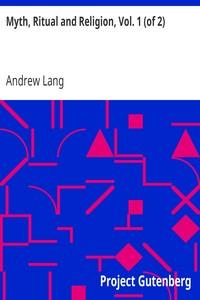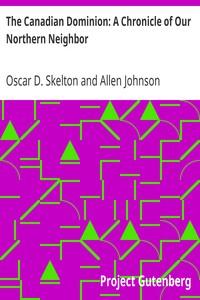Read this ebook for free! No credit card needed, absolutely nothing to pay.
Words: 103419 in 25 pages
This is an ebook sharing website. You can read the uploaded ebooks for free here. No credit cards needed, nothing to pay. If you want to own a digital copy of the ebook, or want to read offline with your favorite ebook-reader, then you can choose to buy and download the ebook.


: Myth Ritual and Religion Vol. 1 (of 2) by Lang Andrew - Religion; Mythology; Myth; Rites and ceremonies Mythology; Paganism
PREFACE TO NEW IMPRESSION.
PREFACE TO NEW EDITION.
Definitions of religion--Contradictory evidence--"Belief in spiritual beings"--Objection to Mr. Tylor's definition--Definition as regards this argument--Problem: the contradiction between religion and myth--Two human moods--Examples--Case of Greece-- Ancient mythologists--Criticism by Eusebius--Modern mythological systems--Mr. Max Muller--Mannhardt.
The mental condition of savages the basis of the irrational element in myth--Characteristics of that condition: Confusion of all things in an equality of presumed animation and intelligence; Belief in sorcery; Spiritualism; Curiosity; Easy credulity and mental indolence--The curiosity is satisfied, thanks to the credulity, by myths in answer to all inquiries--Evidence for this--Mr. Tylor's opinion--Mr. Im Thurn--Jesuit missionaries' Relations--Examples of confusion between men, plants, beasts and other natural objects--Reports of travellers--Evidence from institution of totemism--Definition of totemism--Totemism in Australia, Africa, America, the Oceanic Islands, India, North Asia-- Conclusions: Totemism being found so widely distributed, is a proof of the existence of that savage mental condition in which no line is drawn between men and the other things in the world. This confusion is one of the characteristics of myth in all races.
Claims of sorcerers--Savage scientific speculation--Theory of causation--Credulity, except as to new religious ideas--"Post hoc, ergo propter hoc"--Fundamental ideas of magic--Examples: incantations, ghosts, spirits--Evidence of rank and other institutions in proof of confusions of mind exhibited in magical beliefs.
Savage fancy, curiosity and credulity illustrated in nature myths-- In these all phenomena are explained by belief in the general animation of everything, combined with belief in metamorphosis--Sun myths, Asian, Australian, African, Melanesian, Indian, Californian, Brazilian, Maori, Samoan--Moon myths, Australian, Muysca, Mexican, Zulu, Macassar, Greenland, Piute, Malay--Thunder myths--Greek and Aryan sun and moon myths--Star myths--Myths, savage and civilised, of animals, accounting for their marks and habits--Examples of custom of claiming blood kinship with lower animals--Myths of various plants and trees--Myths of stones, and of metamorphosis into stones, Greek, Australian and American--The whole natural philosophy of savages expressed in myths, and survives in folk-lore and classical poetry; and legends of metamorphosis.
Confusions of myth--Various origins of man and of things--Myths of Australia, Andaman Islands, Bushmen, Ovaherero, Namaquas, Zulus, Hurons, Iroquois, Diggers, Navajoes, Winnebagoes, Chaldaeans, Thlinkeets, Pacific Islanders, Maoris, Aztecs, Peruvians-- Similarity of ideas pervading all those peoples in various conditions of society and culture.
Authorities--Vedas--Brahmanas--Social condition of Vedic India-- Arts--Ranks--War--Vedic fetishism--Ancestor worship--Date of Rig- Veda Hymns doubtful--Obscurity of the Hymns--Difficulty of interpreting the real character of Veda--Not primitive but sacerdotal--The moral purity not innocence but refinement.
Comparison of Vedic and savage myths--The metaphysical Vedic account of the beginning of things--Opposite and savage fable of world made out of fragments of a man--Discussion of this hymn-- Absurdities of Brahmanas--Prajapati, a Vedic Unkulunkulu or Qat-- Evolutionary myths--Marriage of heaven and earth--Myths of Puranas, their savage parallels--Most savage myths are repeated in Brahmanas.
Nature of the evidence--Traditions of origin of the world and man-- Homeric, Hesiodic and Orphic myths--Later evidence of historians, dramatists, commentators--The Homeric story comparatively pure--The story in Hesiod, and its savage analogues--The explanations of the myth of Cronus, modern and ancient--The Orphic cosmogony--Phanes and Prajapati--Greek myths of the origin of man--Their savage analogues.
The origin of a belief in GOD beyond the ken of history and of speculation--Sketch of conjectural theories--Two elements in all beliefs, whether of backward or civilised races--The Mythical and the Religious--These may be coeval, or either may be older than the other--Difficulty of study--The current anthropological theory-- Stated objections to the theory--Gods and spirits--Suggestion that savage religion is borrowed from Europeans--Reply to Mr. Tylor's arguments on this head--The morality of savages.
PREFACE TO NEW IMPRESSION.
Free books android app tbrJar TBR JAR Read Free books online gutenberg
More posts by @FreeBooks








